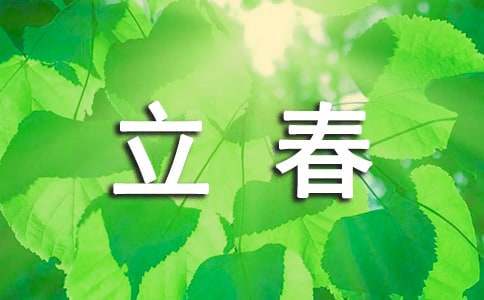- ЯрЙиЭЦМі
СЂДКНкЦјЕФгЂгяДЪЛу
ЁЁЁЁСЂДКЃЌХЉРњЖўЪЎЫФНкЦјжаЕФЕквЛИіНкЦјЁЃСЂДКЪЧДгЬьЮФЩЯРДЛЎЗжЕФЃЌМДЬЋбєЕНДяЛЦО315ЁуЪБЃЌЯТУцЪЧаЁБрећРэЕФЙигкСЂДКНкЦјЕФгЂгяДЪЛуЯрЙизЪСЯЃЌвЛЦ№РДбЇЯАЯТАЩЃЁ

ЁЁЁЁСЂДКНкЦјЕФгЂгяДЪЛу ЦЊ1
ЁЁЁЁЁОНкЦјДЪЛуЁП
ЁЁЁЁSpring Begins СЂДК
ЁЁЁЁЁАSpring BeginsЁБ is the first solar term in the 24 solar terms. In China, it represents the beginning of the spring season. It usually happens between February 2 and February 5when the sun reaches the celestial longitude of 315 degrees.ЁАСЂДКЁБЪЧ24НкЦјжаЕФЕквЛИіНкЦјЁЃдкжаЙњЃЌЫќДњБэСЫДКМОЕФПЊЪМЁЃСЂДКЭЈГЃЗЂЩњдк2дТ2ШеЁЊ2дТ5ШежЎМфЃЌетЪБЬЋбєЕНДяЬьЮФОЖШ315ЁуЁЃ
ЁЁЁЁЁОНкЦјЬиеїЁП
ЁЁЁЁWhen ЁАSpring BeginsЁБ arrives, days get longer and sunlight gets warmer. Temperature, the length of sunlight and the amount of rainfall are all at the turning points of the year. An old Chinese saying goes like this, ЁАSpring begins and rain arrives. Get up early and sleep late.ЁБ It is to remind the farmers that the annual agriculture is about to begin.ЁАСЂДКЁБРДЕФЪБКђЃЌАзЬьЪБМфБфГЄЃЌбєЙтБфЕУЮТХЏЁЃЦјЮТЁЂШеееЪБГЄЁЂгъСПЖМдкУПФъЕФетИіЪБКђПЊЪМзЊБфЁЃвЛОфжаЙњЙХРЯЕФбшгяетУДЫЕЃКЁБСЂДКРДЃЌгъМОЕНЁЃдчЦ№ЭэЫЏЕФШезгПЊЪМЁЃЁАетЪЧдкЬсабХЉУёУЧУПФъЕФХЉЛюе§вЊПЊЪМУІТЕЁЃ
ЁЁЁЁЁОДЋЭГЯАЫзЁП
ЁЁЁЁThe day is also called ЁАBiting SpringЁБ since people eat traditional food such as ЁАSpring RollЁБ andЁАSpring PancakeЁБ.етвЛЬьвВНаЁАвЇДКЁБЃЌвђЮЊШЫУЧдкетвЛЬьГдШчЁАДКОэЁБКЭЁАДКБ§ЁБетбљЕФ.ДЋЭГЪГЮяЁЃ
ЁЁЁЁЁОНЁПЕаЁЬљЪПЁП
ЁЁЁЁWhen spring comes, the natural world is revitalizing and all things are flourishing. Same to the crops, human bodies also start a new round of growth from this day. People should open the windows more frequently to allow the air to circulate and take more physical exercises to enhance their immunity.ДКЬьЕНРДЃЌДѓздШЛПЊЪМЛжИДЩњЛњЁЃКЭзЏМквЛбљЃЌДгетЬьЦ№ШЫЬхвВПЊЪМаТЕФвЛТжИДЫеЁЃгІИУОГЃДђПЊДАЛЇЃЌДйНјПеЦјСїЭЈЃЌМгЧПЪвЭтЖЭСЖЃЌдіЧПУтвпСІЁЃ
ЁЁЁЁСЂДКНкЦјЕФгЂгяДЪЛу ЦЊ2
ЁЁЁЁ"Spring Begins, also called ЁАBeginning of springЁБ, ЁАbiting springЁБ or ЁАheralding springЁБ. ЁАLi(СЂ)ЁБ hereby denotes ЁАbegin or startЁБ in Chinese, meaning that spring turns around, and in the period of spring, ЁАthe sun shines warmly and animals regain vitality and plants turn greenЁБ. But after ЁАSpring BeginsЁБ, Nature wakes and revives in spring, followed by other seasons by turns.
ЁЁЁЁСЂДКЃЌгжГЦЁАДђДКЁБЁЂЁАвЇДКЁБКЭЁАБЈДКЁБЁЃЁАСЂЁБЪЧЁАПЊЪМЁБЕФвтЫМЃЌЦфКЌвтЪЧПЊЪМНјШыДКЬьЃЌЁАбєКЭЦ№енЃЌЦЗЮяНдДКЁБЃЌЙ§СЫСЂДКЃЌЭђЮяИДЫеЩњЛњВЊВЊЃЌвЛФъЫФМОДгДЫПЊЪМСЫЁЃ
ЁЁЁЁFor the 3,000 years leading up to 1912, Chinese life was ordered solely according to the lunar calendar.
ЁЁЁЁДг3000ФъЕН1912ФъЃЌжаЙњШЫЙ§ШезгвРОнЕФРњЗЈЖМЪЧвѕРњЁЃ
ЁЁЁЁIn ancient times, agriculture was the economic mainstay of China and its people, and the purpose of establishing a calendar was to regulate agricultural production. Chinese ancients discovered, through astronomical observation, that during the earth's 12-month orbit around the sun, its changing position gave rise to periodical changes in climate and thus distinctive farming seasons. They subsequently designated 24 positions within the earth's orbit, calling them the 24 Jieqi (24 solar terms).
ЁЁЁЁдкЙХДњЃЌХЉвЕЪЧжаЙњКЭжаЙњРЯАйаеЕФОМУжЇжљЃЌжЎЫљвдМђРњШеРњОЭЪЧЮЊСЫЙцЗЖХЉвЕЩњВњЁЃжаЙњЙХШЫЭЈЙ§ЬьЮФЙлВтЗЂЯжЃЌдкЕиЧђЮЇШЦЬЋбєЙЋзЊЕФЕк12ИідТЃЌЦфЮЛжУЕФжмЦкадБфЛЏКЭЦјКђБфЛЏЯрЭЌЃЌвдДЫРДШЗСЂХЉИћМОНкЁЃЫљКУЫћУЧдкЕиЧђЙьЕРФкжИЖЈСЫ24ИіЮЛжУЃЌГЦжЎЮЊ24НкЦјЁЃ
ЁЁЁЁEach Jieqi was given a name that signified the related meteorological and phenological changes on the earth. For example, Lichun means "the beginning of spring," Jingzhe means "the awakening of insects," and Guyu means "the time to sow wheat." Each of the 12 lunar months encompassed two Jieqi, which were regarded by both the imperial court and farmers as the chronological yardstick through which to plan agricultural production.
ЁЁЁЁУПИіНкЦјЖМгаЯрЙиЕФЦјЯѓКЭЮяЯѓЁЃБШШчЃЌСЂДКвтЮЖзХЁАДКЕФПЊЪМЁБЃЌОЊенвтЫМЪЧЁАОЊабенЗќгкЕиЯТЖЌУпЕФРЅГцЁБЃЌЙШгъЕФ.втЫМЪЧЁАВЅжжаЁТѓЕФЪБКђЕНСЫЁБЁЃХЉРњЕФ12ИідТЃЌУПИідТЖМАќКЌгаСНИіНкЦјЃЌзХБЛГЏЭЂКЭХЉУёЪгЮЊЪБМфГпЖШЃЌЭЈЙ§ЫќРДЙцЛЎХЉвЕЩњВњЁЃ
ЁОСЂДКНкЦјЕФгЂгяДЪЛуЁПЯрЙиЮФеТЃК
СЂДКНкЦјЕФбшгя02-03
ТУгЮгЂгяДЪЛуЃКHotelгЂгяДЪЛу10-21
ДКЬьСљДѓНкЦјНщЩмЃКСЂДКЁЂгъЫЎЁЂОЊенЁЂДКЗжЁЂЧхУїЁЂЙШгъ03-11
беЩЋгЂгяДЪЛу07-06
гЂгяДЪЛуСЗЯА01-22
гЂгяДЪЛуЕФСЊЯыМЧвф11-07
ЫЎРћЯрЙигЂгяДЪЛу06-14
ЙигкЫЏОѕЕФгЂгяДЪЛу11-09